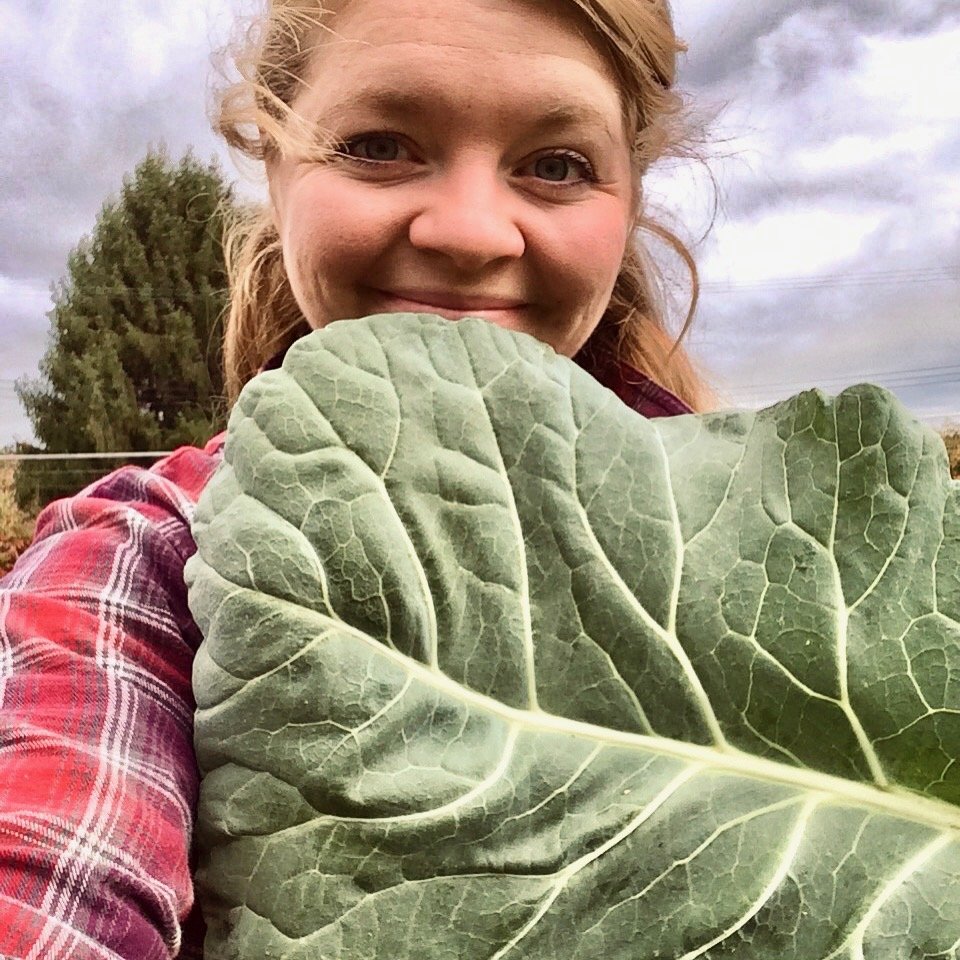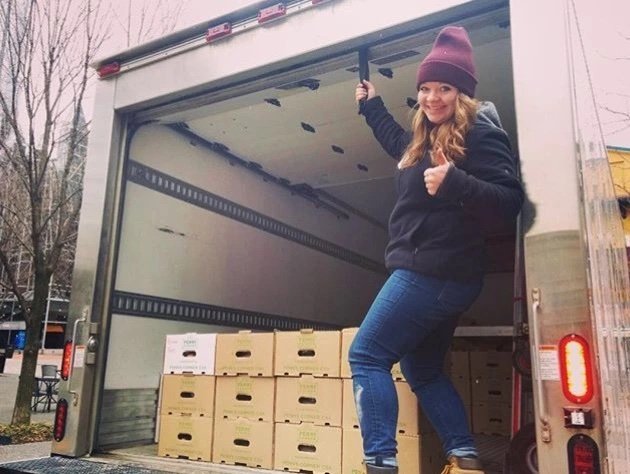ELLEN BAIRD
STEUBENVILLE, OH
Ellen has been working on farms for close 10 years.
WHAT ARE YOU CURRENTLY DOING? (WHERE HAVE YOU BEEN WORKING, ETC)
I’m the Director of Operations of a farm outside of Pittsburgh, Pennsylvania. It is much more administrative than I would like it to be. I’ve had the opportunity to create the job that I have just because the management has changed. Personally I would rather do the farming, but this piece is essential to running the farm and it has been sorely neglected. I’m trying to enforce administrative law in the wild west. Organizing of the financial situation, staff support, resources that they need and also that we are supplying as an employer. A lot of supervision of distribution and logistics and processing orders and getting it out on the road for delivery everyday.
The farm is 175 acres. It’s a diversified farm with several operations. We have 5 acres in vegetable production and follow organic standards, though we aren’t certified, but we do all the IPM, intercropping, cover cropping. We have 500 laying hens and are getting 1800 more. Previously we had a dairy operation and because of that we have a lot of pasture that was in use for that. It was destroyed, and it was managed more commercially. We are trying to implement better grazing structures and going to be using different species - hens, then goats, sheep, cows, an intensive but well managed system. We want to restore parts of the farm this way.
The veggies are sold through the CSA, to restaurants, sports teams (Pirates, Steelers, Penguins) and we have started working with Gordon Food service, which is wholesale.
We also have ice cream production and chocolate milk.
HOW LONG HAVE YOU BEEN FARMING?
I have been working in farming for 6 years, but I started my freshman year of college sort of doing different things on farms in school (internships), so I would say, 10 years.
WHAT INITIALLY BROUGHT YOU TO THE FIELDS?
It was an accident. I was signing up for classes in my freshman year of college. I had 3 courses and needed a 4th, and I was flipping through the course handbook and came across Innovation in Agroecology. It had a lab portion attached where the description said you could work on the on-campus garden and trial growing covercrops. I did not grow up doing any of that besides gardening in my yard. It sounded interesting and my other courses were more humanities focused. I was an anthropology major.
That class was my favorite class and I ended up minoring in environmental studies. That professor became my advisor. I took all the classes that were offered over the following 4 years. I tailored my thesis around anthropological and environmental theory.
That same advisor sold me my farm truck.
For my senior thesis, my focus was called “Breaking Ground, the new and beginning farmers’ movement.” I decided that I wanted to understand better, after research on farmers getting into ag from less typical backgrounds, who they were and why they were doing it. Some of them were women, young people with college degrees, retiring people, immigrants, all kinds of people, people wanting a second job. A beginning farmer was defined as someone with 10 years or less experience farming, and I found 20 beginning farmers in Pennsylvania, Ohio and West Virginia. I interviewed them for thesis.
One of them was Margaret from One Woman Farm.
In my senior year, I applied to be an apprentice at One Women Farm. It changed my life. I was at One Woman Farm for two years.
WHY HAVE YOU CHOSEN TO FARM FOR SOMEONE ELSE (NOW OR IN THE PAST?)
I worked at One Woman Farm for two years and I wasn’t able to keep farming so I worked at Penn’s Corner (a food hub), Macy’s and Head Start. During all of that time I knew I wasn’t satisfied and I didn’t feel like I was being honest with myself of what I needed in my life.
I would say that realistically it’s the practical choice at this time. I don’t have the access to land. It’s a real barrier and I do not have the financial ability to access the land that is around me. It’s expensive and in this area it’s fairly limited. I would also say, up to this point I didn't think I had enough experience to make that jump to do it myself, I didn't feel confident enough to do it. I think I’m pretty much at a point where I would try to do it. I don’t think I would try to do it without another source of income, at least initially. This job checks both boxes - it’s a job close to home to save money and eventually start my own farm, and it’s also a farming job.
It is nice to sort of be able to still learn and do a lot without the ultimate risk being on my own. Learning and preparing to do it all myself at the same time.
WHAT ARE SOME ISSUES FOR FARMERS WORKING ON SOMEONE ELSE'S FARM - ISSUES THAT YOU'VE WITNESSED OR EXPERIENCED?
So on the first farm I worked at, the owner was doing the work too. So that was definitely an experience where we learned by doing. It was not a formalized educational experience. It was haul ass and learn along the way. I’m grateful for the experience, but it was also hard. Her main goal was that it was a business and we needed to do XYZ for it to succeed. Our learning was secondary.
We didn't do a lot of check-ins and we didn’t really talk about the realities of burnout and not checking in with yourself or the toll it can take. I wasn’t fully prepared for what would be asked of me, but I think I handled it and I learned a lot about myself.
I went to work for her for a second year and I approached it differently.At the farm now, this owner is not a farmer and people in supervisory roles are not farmers.
I have to manage expectations when they have a brainstorm that they want to implement. Our job to be the voice of reason and explain why that may or may not be possible, or it would take two years to get to a place that you want to see immediately. They don’t know what they don’t know. I certainly don’t know it all, but I know more about the day to day and can situate ideas.
I’m dealing with the push and pull of it.
Ideologically there are some differences. I'm very independent and I like to be in charge, but decisions aren’t all up to me, I have to factor in other people’s opinions.
I have to enforce things that maybe I don’t agree with. Straddling that line is hard for me.
“I'm very independent and I like to be in charge, but decisions aren’t all up to me, I have to factor in other people’s opinions.
I have to enforce things that maybe I don’t agree with. Straddling that line is hard for me.”
WHAT KEEPS YOU COMING BACK?
What I discovered when I worked on my first farm was that I felt the most myself when I was farming. I’m an incredibly hard worker and very focused. I’m a little bit introverted and a little bit extroverted. I have a high capacity for empathy. When I’ve worked in other jobs, I find it really draining, it takes a lot out of me. With farming, it was a really good physical way to deal with anxiety and strong emotions. I was physically able to work out those feelings.
Also, I feel an immense feeling of accomplishment and pride. I like the tangible reality of that rather than staring at a computer all day.
Farming bridges a lot of things that I love: being outside, working physically and a connection to a larger community. It’s a way to give to people that I wasn’t always able to create in an office setting.
WHAT KIND OF SUPPORT WOULD BE HELPFUL FOR PEOPLE WORKING ON FARMS NOT THEIR OWN?
I think that there are a couple of organizations in my area that are really supportive. I wish I had the time to take advantage. I get emails all the time about workshops, conferences, etc. So many of them I’m interested in, but because of the nature of the job, it’s hard to find the time to take away from the farm to learn more about farming.
My bosses understand and prioritize more professional development and continuing education for staff. It gives you a break from the grind and helps you put it into a larger perspective when you talk to the people who do it.
We have met with a couple of farmers’ locally and that has been a huge resource. I am making a concentrated effort to talk to people in our community.It’s like anything - the visibility of being able to see and meet and talk with other people who do what you do.
ANYTHING ELSE YOU'D LIKE TO SHARE ABOUT YOURSELF & YOUR RELATIONSHIP WITH FARMING? WHAT KEEPS YOU UP AT NIGHT?
Women, as evidenced by my life and research, you never feel like you know enough to justify taking that step for yourself. I feel like I’ve been that for years now and almost fighting with myself this deep urge to do this work, because I know to my core that it’s what speaks to me but I’m holding myself back because I don’t feel like i’m qualified. Knowing all these women who are qualified with knowledge, capacity, heart to do it but think “oh but.”
I remind myself and others that you’ll never know everything.
Michelle Obama said something like, I was in these meetings with all of these leaders and they are JUST people, just like you and me and they have things to learn and sometimes they are wrong. I am no less qualified or capable than them.
I hear that in my head. You can always find a reason to not do it, if it tanks then it tanks.
Why would I not grant myself that same advice that I would give other women that I know who can do it. I am just wanting to be a bit braver.
Everyone who I know in this field got in this field because they took a risk.
WHAT IS YOUR OPINION/TAKE ON THE FARMER LUNCH? (DO YOU TAKE LUNCH, DO YOU SKIP LUNCH, DO YOU ENJOY TAKING LUNCH WITH YOUR CREW - FOR COMMUNITY BUILDING, IS THERE PRESSURE TO BE SOCIAL....)
You need to get enough sleep. Because if you don't, bad things are going to happen.
And eat your lunch.
Self destruction is not helpful. Take a break.


